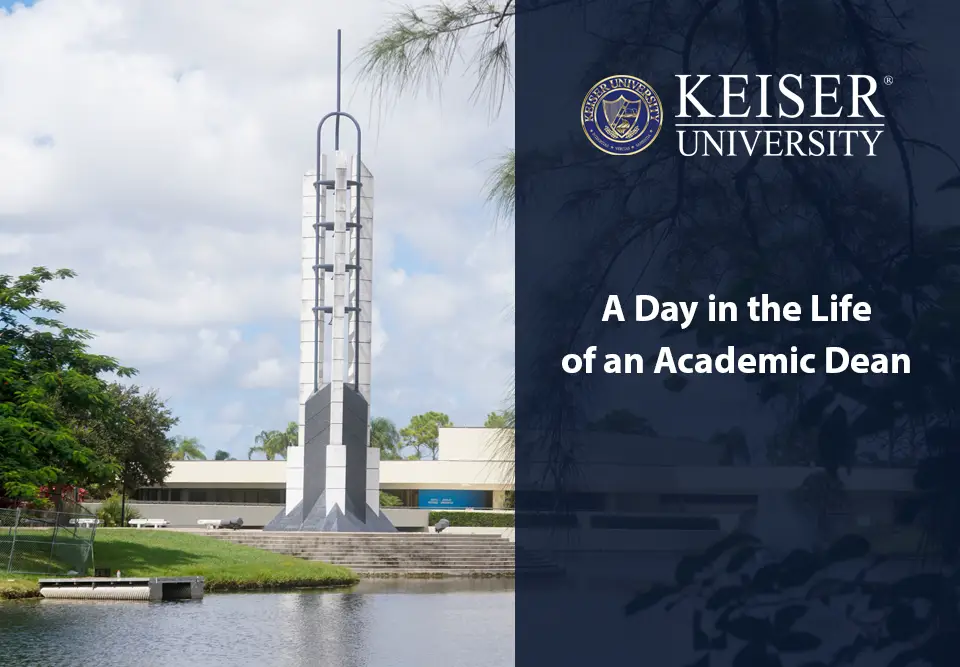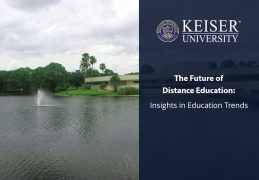Academic deans are deeply committed to higher education. They strive to empower students and faculty members alike, all while bringing colleges’ strategic visions to life. Blending the instructional understanding of faculty with a dose of administrative wizardry, these leaders simultaneously promote excellence and accessibility in higher ed. It takes extraordinary passion and a unique skill set to achieve all this, but academic deans handle numerous challenges with grace and determination.
There is no denying the value of the academic dean in the modern college environment, but it can be less straightforward to determine who is suited to this role and how they can live up to its lofty ideals. Given its unique challenges, it’s important to understand what exactly it means to become an academic dean and what these professionals are capable of accomplishing.
To shed light on this role and its considerable influence within the college environment, the following guide highlights a day in a life of an academic dean. These insights are informed by an inspiring individual — Dr. Ashlee Robertson-Arduengo, who proudly serves as one of the many amazing deans at Keiser University. She was happy to offer a glimpse into academic dean job responsibilities, revealing the rewards of this pathway and even detailing how to become an academic dean.
Getting to Know an Academic Dean
Academic deans drive student success and college excellence. These passionate leaders act as key liaisons between students, faculty members and campus administration. They coordinate complex programs, ensuring that all parties involved have the resources needed to foster academic growth. Dr. Robertson serves as the ultimate example of an academic dean success story, showing how personal passion and professional competence join forces to make a powerful difference in academia and beyond.
What Is an Academic Dean?
Various titles indicate leadership in the college setting. From department chair to academic officer and even provost, there is a range of ways to support student success and influence decision-making at the campus level. The role of dean is distinct, though, as this forms the essential bridge between everyday academic activities and strategic leadership. Academic deans are intimately familiar with the needs and goals of the student bodies they serve, but they also have a hand in high-level decision-making.
What Does an Academic Dean Do?
No two days look exactly alike for an academic dean, who may handle a vast range of responsibilities that can differ from one campus to the next. Given this versatility, some may wonder: What does an academic dean do, exactly?
In general, academic deans share a passion for promoting and maintaining high academic standards as well as giving faculty and students the guidance and support they need. As leaders and collaborators, these deans strive to understand the needs of campus communities as they relate to learning and research while helping cultivate an environment that delivers academic excellence.
What Inspired You to Become an Academic Dean?
Every higher education leader draws inspiration from unique sources. Many, however, share a similar desire to empower students while fostering positive change within the college environment. Some take inspiration from their own previous experiences as college students, hoping to emulate the deans and other leaders with whom they’ve interacted in the past.
Speaking to her earliest sources of inspiration, Keiser’s Dr. Robertson reveals that she was always very driven and goal-oriented, and that these qualities helped foster a desire to make a difference through academic leadership.
What Doctoral Knowledge and Skills Are Applied as an Academic Dean?
It takes years of targeted training to prepare for the unique responsibilities and challenges of life as an academic dean. This begins with enrolling in a relevant doctoral program, such as the Doctor of Education (EdD). More technical skills (like financial, data and project management) along with soft skills (like leadership, problem-solving, collaboration and communication) are all integral to the role.
Dr. Robertson completed a similarly influential program, earning her Doctor of Philosophy (PhD) in Curriculum and Instruction. She feels that this program was right for her because it integrated two of her greatest interests and talents: writing and teaching.
A Day In The Life: Practical Application of Doctoral Learning
Doctoral programs provide powerful preparation for the leadership components of serving as a dean. Dr. Robertson explains that, when earning a PhD in Curriculum and Instruction, key priorities include achieving “alignment between what the industry wants you to teach, what you’re actually going to teach and then how you’re going to assess it to make sure that what you teach is being done appropriately.”
These are also priorities when pursuing doctoral opportunities such as the PhD in Instructional Design and Technology. Many doctoral programs are designed to help aspiring educational leaders infuse deep-seated theoretical knowledge into practical applications — which, in turn, can drive positive changes in the fast-paced world of higher education.
What Does a Typical Day Look Like as an Academic Dean?
Every day as an academic dean presents new challenges and opportunities. Much of this stems from the sheer diversity of the role. For example, Dr. Robertson’s work as an academic dean involves acting as the “leader and manager of the faculty that are within three departments … [Keiser’s] Mental Health Counseling, Psychology and Education departments.”
On a typical day, Dr. Robertson attends a series of one-on-one meetings with the leaders from these three departments, striving to understand their needs and how they can be fulfilled. Other meetings may involve “faculty and students, especially if they’re having trouble communicating together around student needs.”
Interacting with the community is just as essential. This may entail attending community events, which allow deans to develop partnerships that benefit students. Dr. Robertson highlights a meaningful example of this: establishing strong relationships with mental health institutions so that students from the Mental Health Counseling program can secure internships.
This is more of a data-driven field than many might realize, with deans such as Dr. Robertson not only meeting with a variety of people but also examining a wealth of information to reveal how students are doing and where room for improvement exists.
What Are the Primary Duties of an Academic Dean?
The role of academic dean can feel wide-ranging, but this ultimately comes down to supporting students and faculty members — plus ensuring that overarching academic missions or educational visions are upheld. As Dr. Robertson clarifies, there is a heavy emphasis on coordinating departments and collaborating with program leaders. Beyond faculty management, this role may involve strategic thinking and planning, curriculum oversight, community engagement and administrative advocacy.
Characteristics of an Academic Dean
Collaboration is key for academic deans, who may work with many teams or professionals to handle a diverse array of campus challenges. This may involve, for example, meeting with the registrar to discuss scheduling or with curriculum teams to hear proposals for new programs. Working with accreditors and assessment committees is also crucial to promote effective curriculum design and help ensure that any changes made actually meet students’ needs.
Additionally, academic deans must be highly adaptable. They face many difficult-to-anticipate challenges, including not only day-to-day complications but also overall shifts in the higher education landscape. Adept critical thinkers and problem-solvers, they can draw from numerous perspectives and extensive data to help uncover the best solution for any given challenge.
How Do You Define Success in Your Role?
Dr. Robertson has a simple yet meaningful definition of success: understanding that “success is when students are happy…because then faculty are happy — they’re getting along, they’re smiling, they’re loving teaching.” Also important is “strong academic programs that are being delivered by faculty who are really passionate about what they do and how they do it.”
She adds that, although academic achievement certainly matters, she’s most passionate about supporting “faculty who just really, really love working with students and are very passionate about what they do.”
Overcoming Challenges as an Academic Dean
Life as an academic dean can be highly rewarding, but challenges can be expected as well. These professionals are continually coming up against limitations. It may sometimes feel as if there’s not possibly enough time or resources available to implement every idea or support every initiative.
What Are Some Challenges Faced as an Academic Dean?
Academic deans enjoy tackling various types of tasks, but this can lead to significant time management challenges, too. There’s a lot to coordinate — with only so much time and attention available for the many faculty members and program leaders who hope to work closely with deans.
As Dr. Robertson puts it, success as an academic dean is not possible without being “in the trenches” with faculty. Academic deans need to have a certain willingness to “get their hands dirty.” This might involve rewriting curriculum, editing assessment reports, delivering professional development and beyond. In this way, academic deans must be prepared to function as the college’s jack-of-all-trades while also providing oversight for faculty members.
Advice for a Future Academic Dean
Dr. Robertson advises that aspiring academic deans develop solid leadership skills. She distinguishes this from management acumen, explaining that academic deans must have the “techniques to inspire, to bring teams together.” In addition, she recommends that future academic deans develop a “strong foundation in what [they will be] leading.”
This means putting in the work early on — ideally while navigating doctoral programs. She cautions against taking the “short way out,” as doctoral students find the greatest personal and professional rewards when they fully immerse themselves in research and collaboration. This means embracing everything that goes into a day in the life of a doctoral student: engaging in fascinating discussions, diving into intense research and collaborating with diverse students and professionals to discover solutions to complex academic challenges.
Reflection and Insights Into Life As an Academic Dean
No two academic deans will have precisely the same experience, but many are quick to point to the intrinsic rewards of this role and the personal satisfaction they gain from working directly with students, faculty members and other inspiring individuals. Dr. Robertson has plenty of positive remarks about this professional pathway and encourages other aspiring leaders to follow in her footsteps.
What Are the Most Rewarding Experiences as an Academic Dean?
Although Dr. Robertson can highlight a number of beneficial aspects of her experience as an academic dean, she especially values “working with department leaders and being able to support each other as department leaders — that has been most rewarding.” Every interaction and collaborative experience reinforces this core sense of satisfaction.
The work itself is deeply fulfilling, as are Dr. Robertson’s many inspiring accomplishments: securing internship opportunities, contributing to innovative programs and, in general, helping faculty members feel supported and empowered.
Would You Choose to Do It All Over Again?
Given the chance to start over or to potentially pursue a different career path, Dr. Robertson feels confident that she would still want to be immersed in the exciting world of higher ed leadership. “I would definitely do it all again; I think I grew a lot as an individual,” she affirms. If anything, she feels that, if allowed to repeat her professional journey, she would take it a step further: “If I could go all the way back, I would put in more than 24 hours a day because there is not enough time to do all the things that I would love to get done.”
This is the ultimate sign of a rewarding career path — not only feeling satisfied with your line of work and your previous professional decisions but also being so passionate about your role that you want even more time to tackle your core responsibilities. With Dr. Robertson having uncovered her professional passion, she (alongside other faculty members and administrators at Keiser) is well-positioned to empower future leaders to do the same.
Uncover the Secrets to Success in Higher Education Leadership
Looking to follow a similar path to that of deans like Dr. Robertson? Keiser University offers multiple graduate programs tailored to tomorrow’s higher education leaders. Whether you pursue a PhD in Educational Leadership or a Doctor of Education, you can share in the joy of supporting and advocating for students and faculty, all while unleashing a whole new world of possibility in higher education. At Keiser, we’re here to support you in this journey. Contact a graduate admissions counselor today to learn more!






 The instructors at Keiser University impacted my life. They believed in my ability to become a great graphic designer, regardless of how I felt about my skills. KU helped to prepare me for the real world and got me to where I am today.
The instructors at Keiser University impacted my life. They believed in my ability to become a great graphic designer, regardless of how I felt about my skills. KU helped to prepare me for the real world and got me to where I am today.
